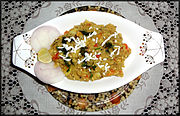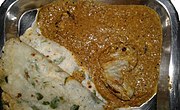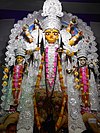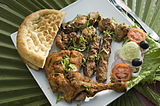Baingan bharta
 Baigan bharta | |
| Alternative names | Begun bhorta Baingan bharta Mashed roasted eggplant |
|---|---|
| Type | Stew, casserole, curry |
| Course | Appetizer, side dish, main course |
| Place of origin | India |
| Region or state | Indian subcontinent |
| Associated cuisine | Indian, Punjabi |
| Serving temperature | 30–60 °C (86–140 °F) |
| Main ingredients | Eggplant, onion, tomato, chili, green peas, cilantro, spices (incl. coriander, cumin, garam masala) |
Baigan bharta, also spelled baingan bharta or baigan chokha[1] (mashed eggplant)[a] is an Indian dish prepared by mashing or mincing grilled eggplant (baigan) with tomato, onion, herbs and spices, with variations being common from chef to chef.[b] Traditionally, cooking the eggplants over charcoals, inside of a tandoor, barbecue grill or oven, or even directly applying flame to the outside of the fruit infuses the dish with a smoky flavour; the blackened skin is then easily peeled and the eggplant may be further prepared.
Baigan bharta is most often grilled, minced eggplant stewed with chopped tomato, browned onion or shallots, ginger, garlic, cumin, and topped with lime or lemon juice, fresh cilantro (coriander leaves) and sliced fresh green chili pepper. Depending on region and personal tastes, ghee (clarified butter) may be used in preparation of the dish. In some regions where mustard oil is popular, this may be used, though it possesses a powerful flavour and aroma. Most chefs use a neutral, high-smoking-point vegetable oil like canola or sunflower oil.[3] Traditionally, the dish is eaten by hand with flatbread (specifically roti, naan or paratha), and can also be served with a variety of rice dishes, like biryani, khichdi or pulao. The meal will usually be rounded-out with various pickles (mango, lime, lemon, etc) as well as raita, a palate-cooling yogurt dish/condiment (similar to Greek tzatziki) with many forms, including mint, mango or cucumber preparations. In Bihar and Uttar Pradesh, it is served hot with litti or baati.[4]
In India, Pakistan and Bangladesh, baigan bharta is part of the most popular cuisine items. In India, it is found in various regional styles, with ingredients varying from one region to another. Some chefs and recipes utilise seasonal mashed pumpkin, squash or sweet potato for added thickness and flavour. The dish has since spread to areas outside of India, particularly countries with high numbers of Indians and their descendants, including the United Kingdom, Australia, and parts of the United States and Canada. It is popularly eaten in the Caribbean, in places like Guyana, Jamaica and Trinidad & Tobago, where it is known as baigan chokha.[5]
Names
[edit]The dish has several regional names, such as:
- Hindi- बैगन का भरता (baigan kā bhartā)
- Urdu- بینگن کا بھرتہ (baigan kā bhartā)
- Punjabi- ਬੈਂਗਣ ਦਾ ਭੱੜਥਾ (baingaṇ dā bhaṛthā)
- Gujarati- રીંગણનો ઓળો (ringaṇ no oḷo)
- Assamese- বেঙেনা পিটিকা (bengenā pitikā)
- Meitei- ꯈꯥꯃꯦꯟ ꯑꯃꯦꯇꯄꯤ (khāmen ametpi)
- Marathi- वांग्याचं भरीत (wangyāchã bharit)
- Kannada- ಬದನೆಕಾಯಿ ಗೊಜ್ಜ (badanekāyi gōjju)
- Telugu- వంకాయ పచ్చడి (vankāya pachchaḍi)
- Tamil- கத்தரி துவயல் (kattiri tuvayal)
- Tulu- ಬದನೆ ಗೊಜ್ಜಿ (badanae gōjji)
- Malayalam- വഴുതന ചമ്മന്തി (vazhutana chammanti)
- Odia- ବାଇଗଣ ଚକଟା (bāigaṇa chakaṭā)
- Bengali- বেগুন মাখা (begun mākhā)
- Sylheti- ꠛꠣꠁꠋꠉꠂꠘ ꠌꠣꠐꠘꠤ (baingoin sātni)
- Bhojpuri- भाँटा के चोखा (bhãṭā ke chokhā)
- Maithili- ভাঁটাক সন্না/भाँटाक सन्ना (bhãṭāk sannā)
- Kashmiri- وانٛگَن ژیٚٹِنؠ (wangan tsetin)
- Nepali- बैगुनको भर्ता (baigun ko bhartā)
Preparation
[edit]The beauty of Baigan Bharta lies in its versatility. While the core ingredients remain the same, regional variations and personal preferences lead to diverse flavor profiles. Some common variations include:
Classic Baigan Bharta: This classic rendition features a vibrant spice blend of garlic, coriander, red chili powder, and cumin.
Dahi Baigan Bharta: This version incorporates dahi for a creamier texture and tangy twist, often balanced with fresh cilantro and Mint leaves.
Spicy Baigan Bharta: For those who love heat, additional chilies or spices like garam masala and fenugreek seeds can be added.
Variants
[edit]In Gujarat, it is called ringan no oḷo (Gujarati: રીંગણનો ઓળો), in which the eggplant is roasted, then mashed, and then sautéed with mustard and cumin seeds, turmeric, red chilli powder, ginger and garlic and salt. It is served with bajra no rotlo (Gujarati: બાજરાંનો રોટલો), kadhi (a soup prepared by gram flour, curd and spices), khichadi and chhaash (Gujarati: છાશ) (buttermilk).
In Karnataka, it is called eṇṇegāyi (ಎಣ್ಣೆಗಾಯಿ) and is prepared by boiling and frying a whole eggplant, and is usually served with akki rotti, while the gōjju (ಗೊಜ್ಜು) is just roasting and mashing the seasoned eggplant. In the South Indian state of Tamil Nadu, the Tamils prepare a similar dish called kattirikāi tayir koṭsu (கத்திரிகாய் தயிர் கொட்சு), in which the eggplant is cooked, mashed, and sautéed with mustard, red chilis and sesame oil. The final step in the recipe involves adding yogurt (curds) to the mixture and dressing the dish with coriander leaves.
In the Bhojpuri-speaking regions of India (such as eastern Uttar Pradesh and western Bihar), it is known as Bhāṅṭā ke chokhā (भांटा के चोखा );[6] it is also popular within the Indo-Caribbean communities of Trinidad and Tobago, Suriname, and Guyana, where many descendants of indentured labourers from northern India live.
In Maharashtra, especially in the northern Khandesh region, vangyache bharit (वांग्याचें भरीत) as they call it is served in social gatherings including wedding ceremonies. During harvest season, a special "bharit party" is organised. Bharit is usually served with puri. In the Vidarbha and Khandesh regions of Maharashtra, two variants are popular: kachha ("raw") bharit and phodni cha (with tadka) bharit. In kachha bharit, all the ingredients except for eggplant are used uncooked. Raw spring onion, tomato, green chillies, green coriander, and sometimes fresh fenugreek leaves are mixed with flame-roasted eggplant along with raw linseed oil or peanut oil. In phodni cha bharit, the above ingredients are first fried in oil with spices; then, mashed eggplants are mixed into it and cooked together. A similar process is followed in other Indian states and Pakistan with slight variations in ingredients. In Vidarbha and Khandesh, it is considered a delicacy when the eggplants are roasted on dried cotton plant stems, a process which gives a distinct smokey flavour to the dish. The dish is served with dal, bhakri, and rice.
-
Baigan bharta made in Nagpur, Maharashtra
-
Akki rotti with eṇṇegāyi, a Karnataka dish
Protest symbol
[edit]In a protest against Bt brinjal and the introduction of genetically modified crops, volunteers from Greenpeace and Delhi's Le Méridien hotel cooked 342 kilograms (754 lb) of organic brinjal bharta at Dilli Haat, New Delhi, on 6 September 2011. This set a world record for the largest amount of the dish produced in one occasion of preparation. A portion of the final dish was sent to Indian Prime Minister Manmohan Singh's residence, accompanied by a letter of protest containing an explanation.[7][8]
Notes
[edit]See also
[edit]- Baba ghanoush, Middle Eastern recipe from baked eggplant
- List of eggplant dishes
References
[edit]- ^ Kumari, Arunima (19 January 2021). Encyclopedia of Bihar. Prabhat Prakashan. ISBN 978-93-5048-390-9.
- ^ Richa Hingle (2022). Vegan Richa's Instant Pot Cookbook: 150 Plant-based Recipes from Indian Cuisine and Beyond. Hachette.
- ^ Jaffrey, Madhur (2011). An Invitation to Indian Cooking. Alfred A. Knopf. p. 162. ISBN 978-0-375-71211-1.
- ^ KUMAWAT, LOVESH (18 May 2020). CUISINE. NotionPress. ISBN 978-1-64850-162-3.
- ^ Clammer, Paul (December 2021). Lonely Planet Caribbean Islands 8. Lonely Planet. ISBN 978-1-83869-004-5.
- ^ Kumari, Arunima (19 January 2021). Encyclopedia of Bihar. Prabhat Prakashan. ISBN 978-93-5048-390-9.
- ^ "Protesters say no to BT Brinjal in a unique way". Hindustan Times. 6 September 2011. Archived from the original on 3 January 2013.
- ^ "Giant Baigan ka Bharta makes for a delicious record". The Times of India. 7 September 2011. Archived from the original on 7 November 2011.
External links
[edit]- Rajasthani cuisine
- Uttar Pradeshi cuisine
- Gujarati cuisine
- Bihari cuisine
- Punjabi cuisine
- Bengali cuisine
- Fijian cuisine
- Pakistani vegetable dishes
- Bangladeshi vegetable dishes
- North Indian cuisine
- Hindu cuisine
- Indian cuisine
- South Asian cuisine
- Vegetarian cuisine
- Vegetarian dishes of India
- Eggplant dishes
- Hindi words and phrases
- Indian vegetable dishes
- Smoked food
- Odia cuisine
- Indo-Caribbean cuisine









